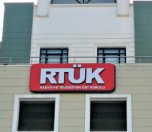Click to read the article in Turkish
Access to the webpages of Voice of America and Deutsche Welle has been blocked due to the two outlets' failure to apply to the Radio and Television Supreme Council (RTÜK) for a license.
After an application by the media authority, the Ankara 1sth Penal Judgeship of Peace yesterday (June 30) ruled for the "censorship" of the two websites.
The Information Technologies and Communications Authority (BİK) implemented the decision on the same day.
The authorities blocked the domains dw.com and amerikaninsesi.com, the web address of the VOA's Turkish service. Both Turkish and English editions of DW are banned, whereas VOA's English edition is accessible in Turkey at voiceofamerica.com.
The RTÜK on February 21 asked VOA, DW Turkish and Euronews to apply for a license within 72 hours, citing a 2019 regulation obligating online broadcasters to obtain a license from the agency.
In April, it withdrew its request from Euronews after it made some changes to its website whereas the other two outlets said they would not adhere to the request and would take legal action against it.
DW: This is unacceptable
Peter Limbourg, the director-general of DW, said the decision was unacceptable for an independent news outlet.
"We had outlined in an extensive correspondence and even in a personal conversation with the chairman of the media control authority why DW could not apply for such a license," he said in a statement quoted by DW.
"For example, media licensed in Turkey are required to delete online content that RTÜK interprets as inappropriate. This is simply unacceptable for an independent broadcaster. DW will take legal action against the blocking that has now taken place."
News of the blocking was already spreading on social media in Turkey yesterday evening. There, users of DW's offerings can find out about ways to circumvent censorship.
The timing of the ban
It was noteworthy that the ban came right after President Recep Tayyip Erdoğan's meeting with US President Joe Biden, Prof. Yaman Akdeniz of the Freedom of Expression Association (İFÖD).
He pointed out that the RTÜK's authority on news websites was exercised for the first time with these bans, which he called a "clear act of censorship."
Erol Önderoğlu, the Reporters without Borders (RSF) representative in Turkey, said the bans were not compatible with the understanding of pluralistic broadcasting and publishing.
"The access block is a decision that will only serve politics and the elections, that doesn't comply with the understanding of pluralistic broadcasting and publishing, and that brings the intolerance regarding this to the international scene," he said.
RTÜK's authority to inspect online broadcastsAccording to the "Regulation on Radio, Television and On_Demand Online Broadcasts" published on the Official Gazette on August 1, 2019, Internet platforms such as Netflix have been obliged to get a license from the RTÜK. These websites also have to establish a company and pay taxes in Turkey so that they can continue operating in the country. The objective of the new legal regulation was explained as follows in the Official Gazette: "The objective of this regulation is to establish procedures and principles as to the online broadcast and transmission of radio, television and voluntary broadcasting services; the broadcasting licences to be granted to media service providers and the authority of broadcast transmission to be given to platform operators; and the inspection of the related broadcasts." It has also been indicated in the Gazette that the regulation in question will apply to "the private media service providing institutions that engage in online radio, television and voluntary broadcasts and the operators of these platforms that provide these broadcasting services." |
(HA/VK)




.jpg)





-132.jpg)